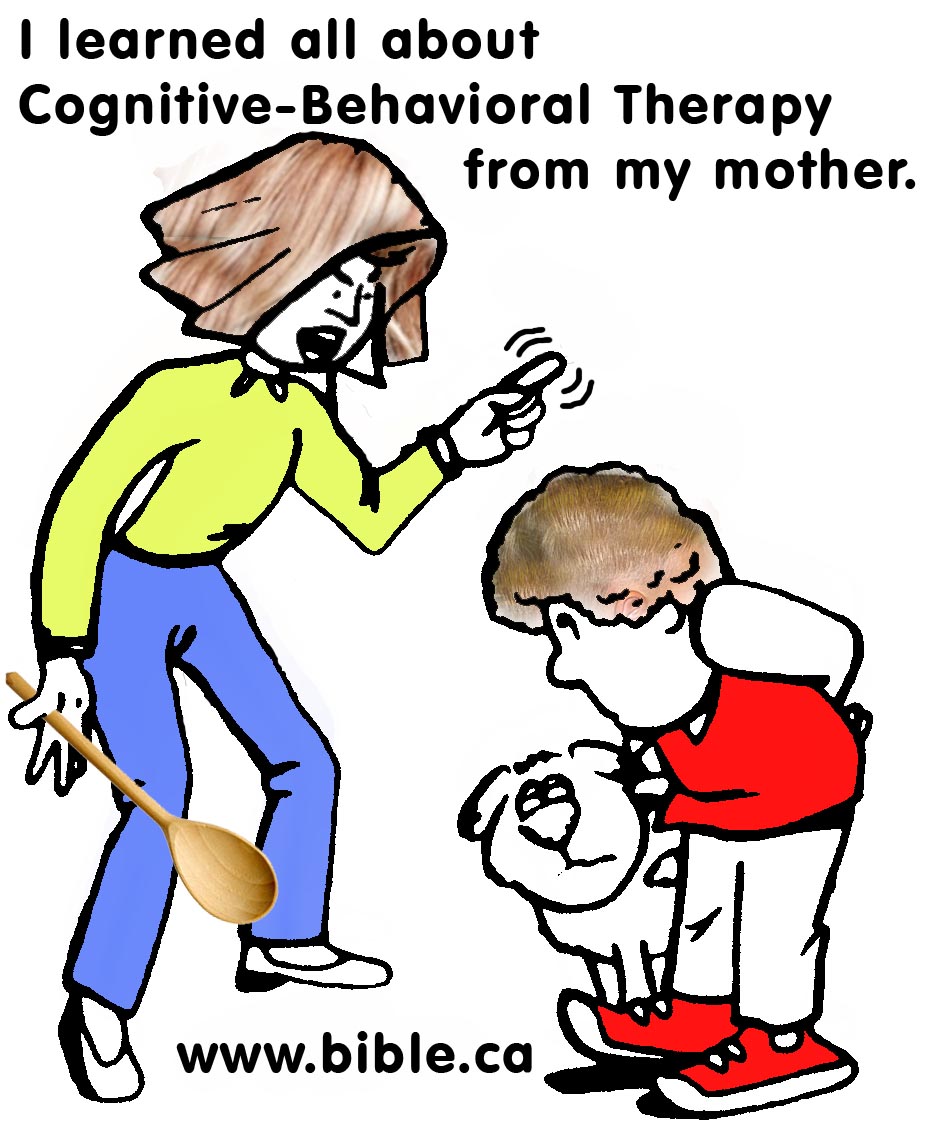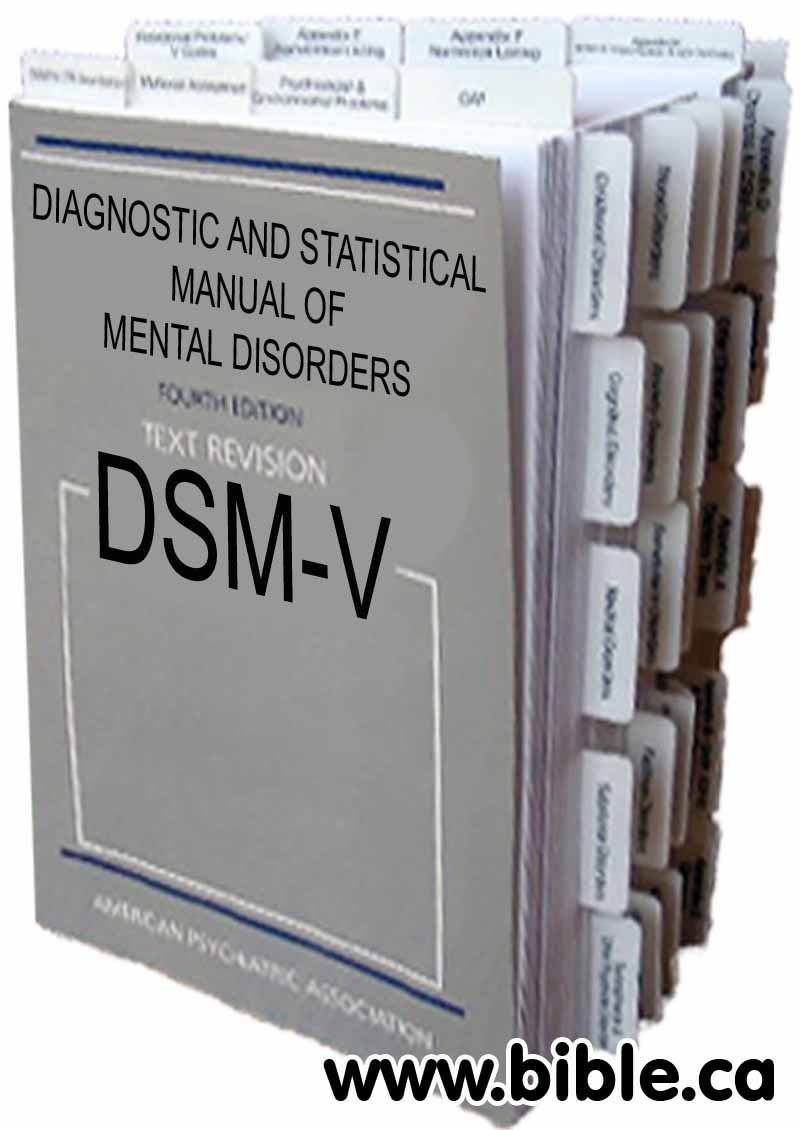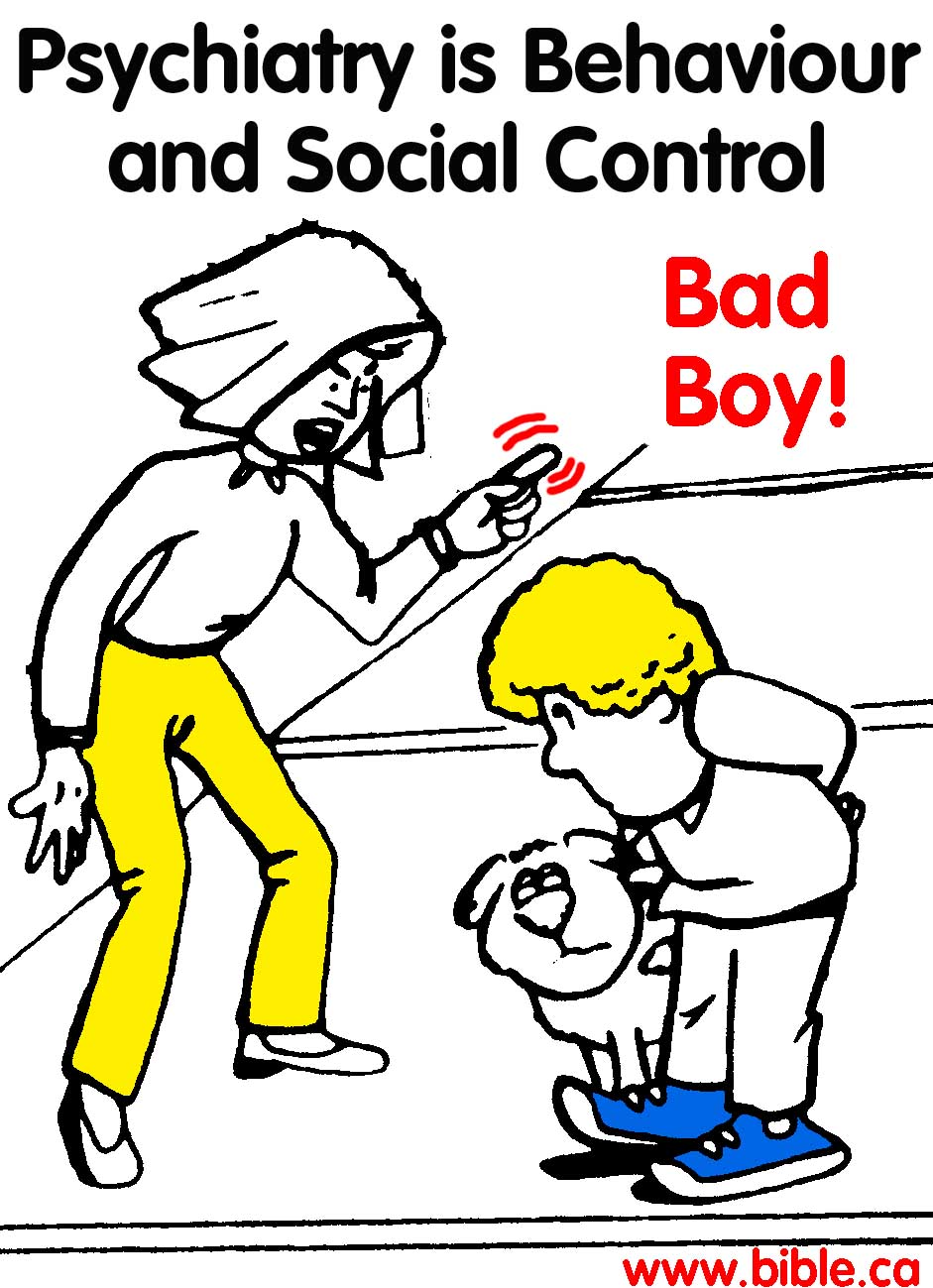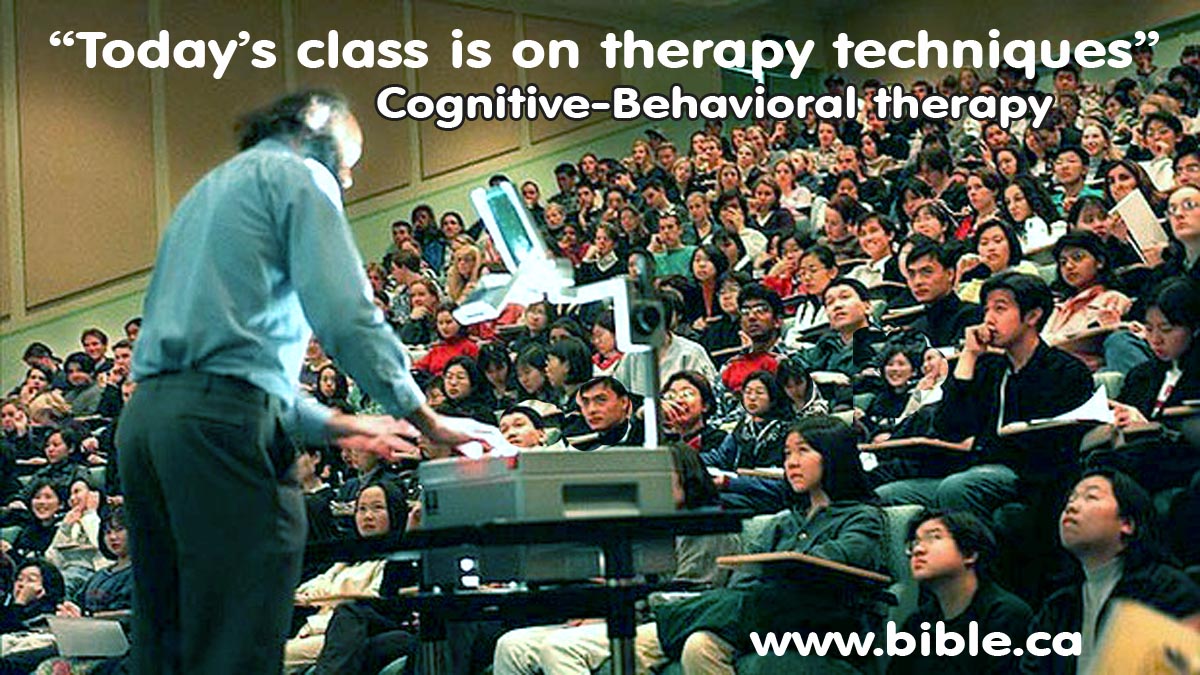The Scientistic Language of Psychiatry and Counseling:
The scientistic language of star trek speaks of phasers, warp drive and dilithium crystals is part of a complete system of fantasy science. The scientific theory behind the language is as complex as real science. Just as "Trekkies" have spent years learning the fictional language of a fantasy science, so too psychiatrists, psychologists, therapists and social workers have spent years learning a language from the various "schools of therapy" and the DSM-5.
|
Everything you ever needed to know about counseling and therapy, you learned from your mom when you were five. |
||
|
|
Ordinary Christians make better psychiatrists than psychiatrists, better psychologists than psychologists and better councilors than councilors! |
|
Introduction: The Scientistic Language of Counseling:
1. In order to make themselves sound smart and educated, psychologists, counselors and therapists have actually invented their own language to describe common, everyday human behaviours:
a. (CBT) Cognitive-Behavioral therapy
b. (SBPT) Strength based perspective therapy
c. (NHAT) Nurtured heart approach therapy
d. (GT) Rogerian therapy
e. (RLT) reflective listening therapy
f. (CCT) client-centered therapy
g. (NDT) non-directive therapy
h. (EDIMT) Egocentric decoy information mining therapy (Gathering history and information interspersed with compliments.)
i. (PRT) performance review therapy (being "present with the person" by asking, "are you getting what you need from me?")
j. (SFT) Solution focused therapy
k. (BF) brief therapy
l. (FAT) Free Association therapy
2. Each one of these are complex and confusing names for simple human behaviours used to "diagnose" you with medical and scientific sounding phrases.
3. We have pioneered "The free, three session, Biblical counseling system". If you need help, get started right now.
4. Detailed study on the Biblical pattern of counseling
Scientific and medical sounding names for everyday behaviour: DSM-5
1. The DSM-5 creates uses Scientistic and medical sounding labels to create the illusion that your behaviour is a medical problem, disorder and disease.
a. Billing an insurance company for treating little Johnny's "temper tantrum" would be rightly met with scorn.
b. But create a Scientistic and medical sounding label called, "Disruptive Mood Dysregulation Disorder" and the insurance company start writing cheques.
c. There is no difference between a "temper tantrum" and "Disruptive Mood Dysregulation Disorder", but the latter sounds like a mental disorder that needs to be treated by a doctor.
d. Therein lays the fraud and the conn of the modern psychiatry and the DSM-5.
2. The DSM-5 has over 300 categories of everyday human behaviour that are usually one of the 153 sins listed in the Bible.
a. There are hundreds of examples of medical sounding names for everyday behaviour.
b. Generally they will take Greek
c. "Trichotillomania disorder" is Greek for "twisting your hair so it falls out"
d. "Dysthymia disorder" is Greek for "someone who sulks, is negative and self-pitying.
e. "Histrionic disorder" is Greek for "someone who loves to be the center of attention through inappropriate emotional expressions, including seductive behavior if all else fails."
f. "Anankastic disorder" is Greek for "someone who behaves in fixed and set patterns of behaviour that cannot be changed".
3. Before the DSM, psychiatry and psychology were not viewed with the same respect and science as true medicine.
a. DSM-5 continues the goal of psychiatrists and psychologists to be viewed as real medical specialists by selecting scientific sounding "Greek word equivalents" for everyday human behaviour.
b. The DSM-5 is the primary billing tool so insurance companies and governments can treat common human behaviour choices and send in one of over 300 alpha-numeric reference codes between F-00.00 and F-99.99.
|
THE NEW DSM-5 The Psychiatry is not medicine, but a profit motivated business Its all about money! The money grab! #1 Purpose of DSM-5: Billing system for insurance companies and money #2 Purpose of DSM-5: Appearance of medical legitimacy |
|
|
|
|
Everything you ever needed to know about counseling and therapy, you learned from your mom when you were five. |
|
|
|
In fact, everything you ever needed to know about therapeutic counseling techniques, you learned from your mother when you were 5 years old. |
|
Professional counselors and clinical psychologists flatter themselves with their credentials as though they possessed some special skill that the general public lacks when it comes to helping others with their problems. |
|
|
|
|
First day of University Class on counseling techniques
Imagine the first day of classes for a person has decided to go to university and get their degree to become a psychologist. Imagine the professor shows them a video of a real 30 minute counseling session between an experienced therapist and a person suffering from depression.
|
Welcome Class. Your assignment is to watch this video and identify as many "therapy techniques" as you can. |
Being the first day of class, the professor wants to impress the students with the skills they will have learned when they graduate in four years. At the end of the video, the professor turns on the lights and asks the students how many different "therapy techniques" they were able to identify. When no hands go up, he then lists the following techniques to the astonishment of the class on the big PowerPoint screen:
The Twelve Step program to becoming a Clinical Psychologist: Therapeutic Counseling Techniques
1. (CBT) Cognitive-Behavioral therapy
2. (SBPT) Strength based perspective therapy
3. (NHAT) Nurtured heart approach therapy
4. (GT) Rogerian therapy
5. (RLT) reflective listening therapy
6. (CCT) client-centered therapy
7. (NDT) non-directive therapy
8. (EDIMT) Egocentric decoy information mining therapy (Gathering history and information interspersed with compliments.)
9. (PRT) performance review therapy (being "present with the person" by asking, "are you getting what you need from me?")
10. (SFT) Solution focused therapy
11. (BF) brief therapy
12. (FAT) Free Association therapy
The entire class of students is "blown away" and excited they will become experts in these twelve therapeutic counseling techniques in just four short years. However, in the class of 200, one of the students had invited her girlfriend to accompany her for her first day classes. This woman was a young mother of two, unable to go to school full time
|
My fellow Students... "I would like to teach you in 5 minutes everything you will ever need to know about being a psychologist. As a young married woman your age, and a stay at home mom, I have been using all these therapeutic methods on my six year old son who started school today, just like all of us! Wahoo. I would also like to teach you about the therapeutic counseling technic called (WWJD)" |
This young woman was a Christian who knew her Bible well. She raised her hand and asked the professor to address the class. The professor agreed, not knowing she was merely auditing the class for that one day. She came down the stairs of the amphitheater and stood beside the professor, asked him to sit down then addressed the class.
"My fellow students, I would like to teach you in 5 minutes everything you will ever need to know about being a psychologist. The professor, being amused by this nodded his approval. She smiled back then said this to the class"
"As a young woman your age, and a stay at home mom, I have been using all these therapeutic methods on my five year old son. And when I am done, you will learn that you have already used them yourselves for years when we have those "girl talks" with each other.
Amused, the professor gives another approving nod to continue.
"Let me illustrate the point, (signaling the professor to turn down the lights, lower the projector screen and start the PowerPoint presentation.) how many of you are able to identify the subject, predicate of every sentence you speak and bad grammar like "dangling participles"?
A hand goes up, "Isn't a dangling participle an opossum?"
"No" she said, "that's a dangling marsupial."
"Ok, so although none of you can identify the components of your everyday language, since you are only first year university students of the most expensive education system in the world, you can still communicate with each other perfectly! In other words, no one needs to be able to identify the predicate of their sentences they speak to be able to speak well. And even though have no idea what a dangling participle is, you'all know bad grammer when you'all done all heard it with both of yord'ears.
Laughter erupts as the class beings to concentrate with full intensity and curiosity.
She continues, "Just as you know how to speak without knowing the names of the grammatical rules, so too, you already know how to counsel without learning the names of the 12 therapeutic counseling techniques. Spending $100,000 and four years to learn the names of the 12 therapeutic counseling techniques won't make you any better at counseling than you are here today. What you will have is an impressive credential like "clinical psychologist", "social worker", "certified therapist", "counselor" and an impressive vocabulary of scientistic sounding names of the methods I have been using with my 5 year old son. You can get an English degree and learn the components of sentence structure, but it won't make you a better and more creative writer and communicator. You can get a psychology degree, and learn the 12 components of counseling, but that won't make you a better counselor than you are today. Just as being able to identify the subject, predicate and bad grammar like "dangling participles", is utterly irrelevant to knowing how to communicate, so too, is wasting $100,000 to get a psychology degree to identify the different components of instinctive human communication called counseling. Everyone already knows how to counsel, even if they have never learned the fancy scientistic words and phrases that dissect a complete process into partitioned, distinct little irrelevant pigeon holes."
Agitated, the professor interrupts, "care to give an example for the class"?
|
"Sure" she says, "Yesterday I had a 30 minute "Cognitive-Behavioral therapy session" with my five year old son.... when I sent him to the time out chair."
Her girlfriend in the audience raises her hand and asks, "You mean Cognitive-Behavioral therapy is when we were disciplined by our parents as children?"
"Yes" she answers. "But you won't learn that till 4th year." |
|
"In fact", she continues, "I routinely combine Cognitive Behaviour Therapy (CBT) with Freudian Free Association Therapy (FFAT), when I rattled the wooden spoons in the kitchen drawer as a warning to my disobedient tot. When he hears the sound, he automatically "associates" his last spanking with a wooden spoon and immediately stops the bad behaviour. Wow! Who would have ever thought all young mothers were smart enough to combine these techniques only taught in post graduate psychotherapy courses? When someone has a credential like, "clinical psychologist", "social worker", "certified therapist", all it means is they have learned a new language to describe skills they had already mastered before their first day of classes." |
|
Likewise, in the psychiatrist's Bible called the DSM-5, they have invented over 300 categories of everyday human behaviour. "Trichotillomania disorder" is Greek for "twisting your hair so it falls out". "Dysthymia disorder" is Greek for "someone who sulks, is negative and self-pitying. "Histrionic disorder" is Greek for "someone who loves to be the center of attention through inappropriate emotional expressions, including seductive behavior if all else fails." |
|
||
|
|
Since many of my girlfriends come to me for advice once in a while, I decided to come up with a few fancy sounding labels for everyday behaviours. This way, I sound real smart and like an expert! After listening to my friend for a while I lower my voice and say quietly but firmly: "Sounds to me you have AID". When I tell them is it "atheism induced depression" not AIDS, they are relieved and it breaks the ice a bit and now I have their full attention!
So here are a few I came up with: |
||
1. AID: "atheism induced depression" with an etiology of belief in Darwinian evolution that causes a lack of purpose, design and meaning. These are entirely predictable feelings if you believe in evolution and think your life just a random chance process. I tell them to change religions from humanism and become a Christian and start reading their Bible. And of course, I invite them to church next Sunday!
2. LCD, LCA: "Life choices depression or anxiety" caused by a low paying job because dropped out of school, or got fired or quit, or unable, bad business deal, stock market. So stay in school girls!
3. LSD: "Life Status depression or anxiety" Can be caused by a bad marriage, slavery, lack of education, handicapped, disease, disability.
4. SID: "Sin induced depression or anxiety". Even if you don't believe in God we will all suffer the consequences of our sins!
5. SIS: "Sin induced schizophrenia". Sometimes people do such bad things that they choose to live in a fantasy world of their own making in order to escape the real world.
6. AIS: "Anger induced schizophrenia". Caused by such intense hatred and anger that you become psychotic.
7. MOA: "Money oriented Anxiety" The love of money is the cause of all sorts of evil and many people suffer as a result.
While Psychology university professors refuse to define "normal behaviour" but deflect this discussion to the realm of philosophy class, Christian's learn in Sunday school that Jesus is the only black and white standard of normal behaviour and memorize the only "Therapeutic Counseling Technique" they will ever need to use by making bead wristbands with four letters on it: WWJD.
Irritated, the professor turns on the classroom lights and says to the upstart, "Right you are. Everything you have said is correct. They must learn this new medical sounding language of everyday behaviour in order to graduate with their counseling degree in four years. In fact every "clinical psychologist", "social worker", "therapist" and "counselor", knows what you have said it true. But none of you can't make money counseling people unless you play our game, spend $100,000 and spend four years learning the lingo and get the credential added to your name... it's the law."
The professor announces: "Class dismissed, see you tomorrow. Make sure your tuition dues are all paid up so I can take next semester off with all my "bankable sick days" I have accumulated through the union contract!"
|
|
|
"Psychoanalysis is medicalization squared. It is important, in this connection, not to be fooled by lay analysis, clinical psychology, or social work. These and other non-medical mental health and counseling "professions" are medicalizations cubed: as if to compensate for their lack of medical knowledge and medical privileges, nonmedical mental health "professionals"[ie. clinical psychologists, social workers] are even more deeply committed than psychiatrists to their claim of special expertise in the diagnosis and treatment of mental illnesses." (Psychiatry, the science of lies, Thomas Szasz) |
|
|
Therapeutic counseling methods explained:
1. Cognitive-Behavioral therapy was invented, so the story goes, by American psychiatrist Aaron T. Beck. Amazingly, a mother uses Cognitive therapy without knowing it, every time she spanks her child, imposes time outs, takes away favorite toys, imposes work and groundings and says the word, "NO!" while quoting supporting Bible verses for her moral authority. What did mothers do before our hero Beck came along and saved humanity with his revolutionary new Cognitive-Behavioral therapy? How did mothers, who had never heard Beck's slogan "the way we perceive situations influences how we feel emotionally," know that a good spanking will produce obedient happy children? Even more amazing, mothers don't even sit down and explain to the child the theory of why a spanking will make them happier. How did mothers instinctively know Becks famous theory, that a spanking brings about a change in behavior, even though the child doesn't understand why he is happier after being hit with a wooden spoon? Now we know where Beck got his idea for "Cognitive-Behavioral therapy" in the first place... his own mother taught it to him and when he grew up he had to find some way to make money!
2. Strength based perspective therapy: is where a mother constantly reminds her son that although he is struggling with spelling, he excels at math and is the star of the peewee hockey team. Where did she learn this without ever taking a psychotherapy course?
3. The "Nurtured heart approach" is the "Strength based perspective therapy" on steroids where you, with manic enthusiasm, bombard kids with positive praise when they are obedient in the smallest things. When the world outlaws spanking as an option for keeping children in line, they must find some other unnatural path to achieve the goal. The Nurtured heart approach is one of many new pop psychology methods invented for teachers, child care agencies and foster parents to use when simple and effective spanking is not an option. Hype the positive, ignore the negative: "Johnny, that is so amazing that you drank your milk without spilling it... let me get the camera and put the photo on the fridge as a reminder of your stunning accomplishment." However, if Johnny sets the cat on fire for the third time, you flinchlessly lead him in silence to the time out bench in a malaise of emotionless "laissez-faire". In other words, show lots of emotion and praise over the smallest good stuff and show no emotion over the biggest bad stuff. The problem is that all kids immediately see through this very unnatural collection of alien, non-human, psychopathic-like even schizoid-like behaviors. When a child sins, the parent is commanded to "be angry but do not sin." God's wisdom tells us that children need to clearly know and see that their parents are angry with them and artificially suppressed expressions of angry are harmful to the child's development. Unnatural expressions of praise are just as damaging as unnatural expressions of discipline. All this skewed, out of balance praise may also turn little Johnny into a hyper narcissist when he is "all groad up". The technique probably works in the short term, because the child gains more personal satisfaction and pride out of acquiring psychotic levels of undue praise. The parents are not spending enough personal time with their kids which is the root cause of most behavior problems. Kids are attracted like magnets to the behaviors that get them the most attention, whether good or bad. So it is not that the parents praise more vs. rebuke less, it is that the parents give greater attention to good behavior and none to bad... all the while never addressing the root of the problem, which is children starved of their parents time. This explains why creating a greater negative fuss over bad behavior than positive fuss for good behavior actually makes these time starved children act worse. They are attracted to whatever gets them the most time and attention from their parents. Certified family counselors can use the Nurtured Heart Approach Therapy to con a lot of parents into paying $125 per half hour to teach them this damaging technique. You can make a lot of money selling a lot of books. If this was anything other than a business, it would be openly taught free of charge like churches do.
4. Freudian Psychotherapy is Freud's invention that theorizes that unresolved conflicts and painful events from the past, manifest themselves through dreams and general anxiety or unhappiness in the present. He also invented the idea of "repression", which is an automatic psychological reflex of forgetting memories in order to escape their pain. Unfortunately every mom knows that children are never bothered by painful events they have forgotten or are unaware of. If you can't remember it, it either never happened or it is not bothering you. The idea of interpreting dreams is something better left for Joseph and Daniel with divine assistance. Paying someone $125 for 30 minutes every day for years, to interpret your dreams and invent non-existent events in your childhood to explain the reason of your present unhappiness is stupid and futile. When moms comfort their children who might have a nightmare, she always discovers the obvious cause or the child just tells her. Psychotherapy therefore, is the Mt. Everest of pure junk pop psychology. Moms never use psychotherapy to because it is usually obvious what makes children and adults happy. The difference is that children don't lie when asked.
5. Transference: A fancy Freudian word with a bizarre definition, that describes how a client tries to seduce her councilor into bed. Freud taught that the reason a client wanted to have sex with her councilor is because of her forgotten "regressed" memory of when she was being bottle fed by her dad, whose love she always desired but never attained. She transfers these feelings of longing for love from her father to the councilor.... Ya right! More likely she is bored and lonely and wants a bit of fun and excitement and after all sex does feel good! Although the rare church minister who has a moral lapse and commits adultery makes front page news, therapists and counselors have historically had a failure rate 1000 times greater as "those who enter into households and captivate weak women weighed down with sins, led on by various impulses" (2 Tim 3:6) What Freud didn't understand was that meeting weekly with a man in private room for an hour was for many clients, a form of foreplay, not psychotherapy... and that's all you need to know about Freudian transference.
6. Carl Roger's therapy, also known as reflective therapy, client-centered therapy or non-directive therapy, is where the client is asked leading questions without ever venturing any direct guidance or input. The answers to the problems lie not in the paid expert, but in the person himself. You will pay for 25, ˝ hour counseling sessions and never get a single bit of advice. When the client makes a statement, questions are asked like, "How does that make you feel or why do you think you did that or do you think that was a good thing to do?" Insurance companies offer the cheapest liability coverage for Rogerian therapists because they can never be held liable for giving bad advice... or any advice at all for that matter. This is only a half notch less ridiculous than Freudian psychotherapy. How very different is the process of when you go to your local church elder and seek his advice and guidance. While therapy schools give credit to Rogers for inventing the reflective questioning method, he actually learned it from his mother when she asked him, "How do you think you would have turned out if I never taught you right from wrong?" and "How would you feel if I was so frightened of getting sued, that I never actually told you what to do?" So reflective questioning as a method of getting people to talk and express themselves is not something Carl Rogers invented, he learned it from his mother when he was 5 year old.
7. Solution therapy: Solution focused therapy (SFBT), or "brief therapy", is what mothers do when they ask their son, "what do you want to be when you grow up", then helps him achieve that goal over time with little statements like, "Now if you want to be a fireman, you need to eat your peas so you grow up to be big and strong." Life coaches and career counselors use non-directive "Rogerian" reflective questioning to help the client learn what they want to be. We wonder if Zig Zigar and Tony Robins have ever given any credit to their mothers for teaching them the technique while they sip cold drinks in a hammock on their private tropical island.
8. Free Association Therapy (FAT): You are shown ink blotched and asked what you see. When an older man smells baking chocolate chip cookies, it automatically triggers the vision of his mother in her apron in the kitchen when he was 5. You hear a piece of music and you immediately remember a specific historic event in your life. The theory behind FAT, is to get an idea what is on the person's mind by what they see in otherwise abstract objects. A teenage boy would predictably see a lot of female body parts. A mother of young children might see a lot of stick men like her children draw. An architect might see buildings. Someone who is sad might see sad and gloomy things. Someone who is hungry might see plates of food. While it is true that a child sometimes draws what is on his mind, it is dangerous and silly to conclude a happy child is sad, hurt or suffering based upon what he draws. This is like communicating in Morris Code when you have a cell phone in your hand. A mother doesn't use ink blots to figure out why her 5 year old so is sad, she just asks!
Conclusion:
1. The ability of a person to counsel another is based primarily on their life experience, not education credentialing.
a. An elderly person with grade 2 education will generally always make a better counselor than a 25 year old clinical psychologist.
b. The myth is that credentialing trumps life experience.
c. In fact, credentialing is a nothing more than a prerequisite for a business license, access to public tax money and insurance company liability policies. (You can't get an insurance policy to pay you as a counselor unless you provide credentialing.)
2. The only difference between the counseling ability of a young mother and a trained credentialed therapist is the name they call the techniques. The skill set is identical, but therapists spend four years learning fancy scientistic sounding words for techniques young mothers use by instinct with their children.
3. These fancy, important sounding names are essential to deceive the general public into thinking therapists possess some unique skill worth paying $125 per half hour for.
a. It's has been a successful business plan to extract the counseling function away from church ministers and make it a primary vocation.
b. Whereas church ministers view counseling as a distraction which they provide as a free service on an "as needed basis", therapists make it their primary vocation for money.
c. Pastors provide free counseling as a distraction from their main job, counselors make it the focus of their work for profit.
4. If a young mother actually sat little Johnny down and said, "You need Cognitive Behaviour therapy", it would be viewed by her girlfriends as a joke. The only joke is that this same mother might pay a therapist huge sums of money, who doesn't know any more about counseling than she, but uses these impressive sounding phrases!
5. Just as church ministers were banished from direct involvement with institutional psychiatry in about 1775 AD, so too with simple counseling in about 1975 AD.
a. Today church ministers are prevented by law from referring to themselves as "councilors" unless they take the "two week course" and get some formal credentialing.
b. Even though pastoral counseling has been the historic "gold standard", it has been replaced by money motived secular, non-religious counterfeiters, who generally do more harm than good because they refuse to take direction from scripture.
c. It is a satanic inversion of the natural order of things and a fraud.
6. Just as medical doctors "took over" the traditional turf of church ministers in helping the insane, so too psychologists have "taken over" the traditional turf of church ministers in helping those with common life problems. Whereas church ministers generally provided counseling for free, atheists saw an opportunity to make a full time living.
a. So first they invented the scientistic language
b. then second, they invented a curriculum in educational institutions
c. then third, they lobbied governments to legally trademark and credential counseling as "therapy"
d. and finally, they expelled church ministers entirely from the "market".
e. The end result is an inverted system where real medical doctors are forbidden to practice but those who use humoral medicine and bloodletting are the only ones who are legally recognized as experts.
7. Although the word psychiatrist means, "Doctor of the soul" and church ministers were the traditional professionals who worked with the insane, they are forbidden by law from using the term in reference to themselves.
a. Stranger still is the fact that the vast majority of psychiatrists today are atheists who don't even believe in the soul or the dichotomous nature of man.
b. If ever there was a "skitzo" [split] in thinking, here we have atheists functioning as secular church ministers and calling themselves something they believe is a delusion: "doctor of the soul".
c. The term "psychiatrist", coined by Johann Christian Reil in 1803 AD, is a historic monument to the theistic origins of today's atheistic biopsychiatry.
8. Psychologists, professional therapists and counselors have created a medical trademark for every single term in the Bible that church ministers have traditionally used to refer to their historic work as "counselors". It is utterly absurd that church ministers are legally forbidden to refer to themselves as a counselor unless they learn from atheists in a secular educational institution how to do their job and get a "certified, recognized credential".
9. Insurance companies who insure churches today actually warn church ministers not to ever use the "C" word (counselor) when they talk to people.
a. Instead pastors are instructed by insurance companies to describe their historic traditional work, not as offering counseling, but as offering "spiritual insights".
b. This is absurdity gone to seed and it sounds more like something you would hear from non-Christian "new age spiritist" Shirley Maclaine, than from a Christian.
10. Trademarking the word "counseling" is like copyrighting the breathing of air, since counseling is something every person on earth does every day, and just as automatic and involuntarily as breathing.
11. If you feel compelled to be counseled by a professionally credentialed stranger, beware that only one in a thousand are any good. You will learn from the experience that the only difference between good and bad professional therapists, is the length of time it takes for them to give you the same advice your best friend already told you for free over coffee.
12. If you still must be counseled by a stranger who knows all 12 therapeutic counseling techniques, why pay so much for it? Go down to the playground and give some young mother $20 buck to give you good advice. She can use the money and her advice will be right.
13. The truth is that everyone understands how to counsel, but the quality of advice you get will be maximized if the counselor is very familiar with the Bible, not a university degree.
14. The older the person, the better they are qualified as counselors regardless of their formal education.
15. The bible gives a list of qualifications for the most qualified counselors on earth:
a. "must be above reproach, the husband of one wife, temperate, prudent, respectable, hospitable, able to teach, not addicted to wine or pugnacious, but gentle, peaceable, free from the love of money. He must be one who manages his own household well, keeping his children under control with all dignity and not a new convert, so that he will not become conceited and fall into the condemnation incurred by the devil. And he must have a good reputation with those outside the church, so that he will not fall into reproach and the snare of the devil. " (1 Timothy 3:1-7)
16. The all-sufficient moral guide book of human behaviour easily reverse engineers, decodes and restores the complex scientistic language of psychiatry back into its original language of everyday conversation that men have been familiar with for 3500 years.
17. It is important to remember that church ministers view counseling as a diversion from their primary role as an evangelist. Their counseling is designed to mop up the sin and misery a person has caused themselves through their own bad choices as fast as they can, with the least time and energy expended, so they can get back to their main job of teaching the gospel.
a. Professional counselors and therapists, on the other hand, derive their primary incomes from the sinful misery people have entangled themselves in but never seek the salvation of their soul.
b. Credentialed therapists and counselors need to prolong the counseling process as long as they can in order to make their mortgage payments at your expense. Often, they rarely even give any concrete advice but merely ask you how you feel about this or that.
c. Church ministers seek a fast solution with as few of counseling sessions as possible. They give solid judgmental advice based upon the moral code of the Bible and leave it in your hands to either reject or obey the advice.
18. Psychiatrists and psychologists are both equally guilty of creating ridiculous, but medical sounding names for everyday things:
a. Psychiatrists created the DSM-5 that selects Greek work equivalents for common human behaviour choices to make them sound scientific and medical. Then they make them sound like diseases. "It's all a matter of definition—of naming and labeling. When emotional discomfort or suffering is defined as a "disorder," it creates business for doctors and drug companies. The campaigns to promote "mental illness" have been so successful that, within a matter of a few years, millions of Americans have come to believe that they have "biochemical imbalances," "panic disorder," or "clinical depression," and that their children have "ADHD," and bipolar disorder, and oppositional defiant disorder." (Your Drug May Be Your Problem, Peter Breggin, David Cohen, 2007 AD, p 112)
b. Psychologists created "Therapeutic Counseling Techniques" with clinical, scientific and medical sounding names for common human dealings.
|
|
|
|
The 10 minute Video Challenge |
|
|
Mental illness is behaviour and not disease. Ritalin is poison not medication. (ADHD) (4 minutes) |
The DSM-5 is the Atheist's Moral Code, the psychiatrist's Bible. (6 minutes) |
|
|
|
By Steve Rudd: Contact the author for comments, input or corrections.
Send us your story about your experience with modern Psychiatry








